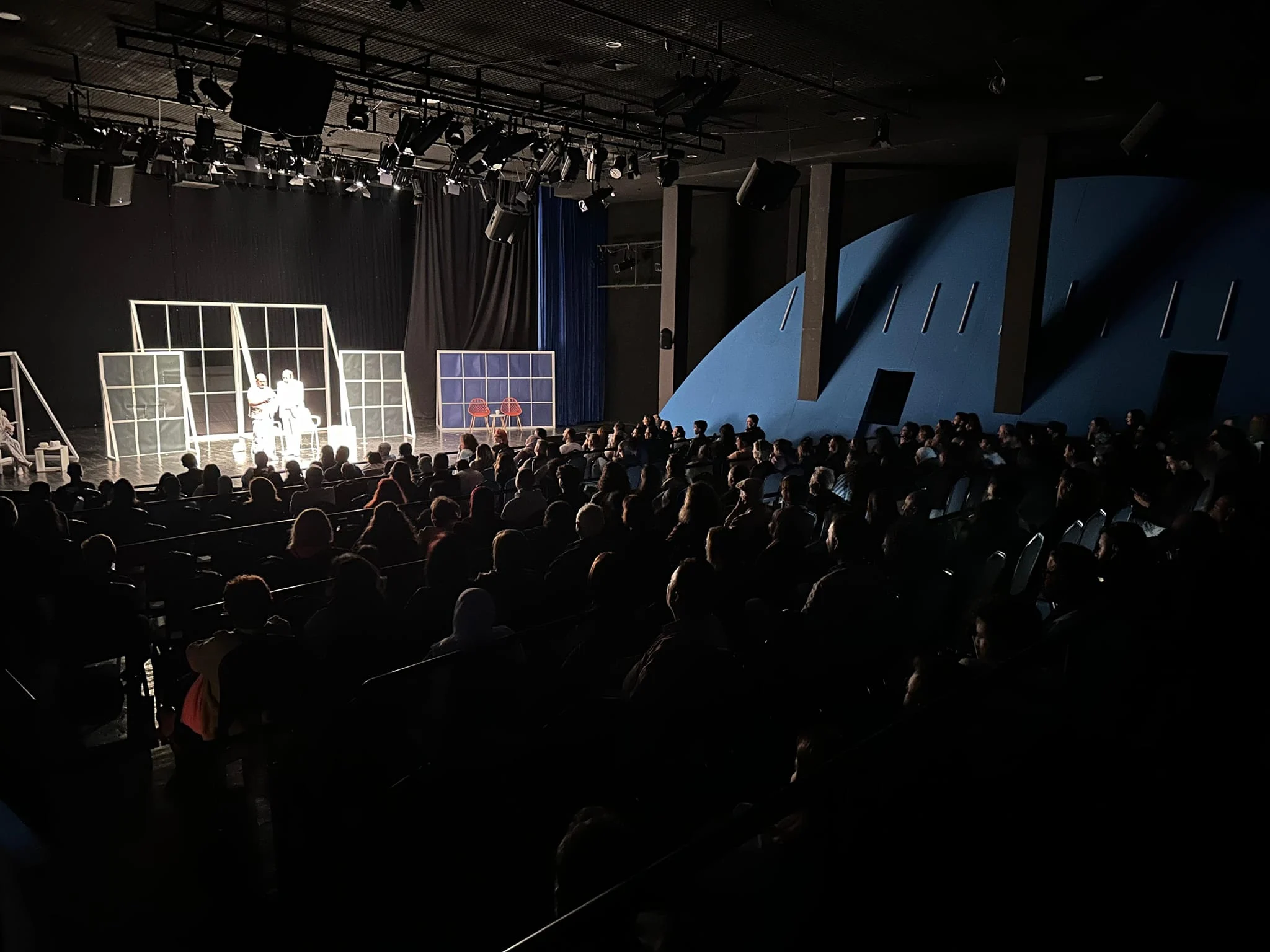
Two tenors of the Lebanese stage: Ziad Itani and Talal al-Jurdi. (Credit: Metro al-Madina)
The flickering electricity, the crumbling infrastructure, the pervasive chaos and the unsettling feeling that everything is spiraling toward the worst... Amidst this maelstrom, Talal, a psychiatrist portrayed by Talal Jourdi, endeavors to maintain his composure. In his clinic, nestled between appointments, he meticulously dissects the statements of local officials.
He revisits Free Patriotic Movement (FPM) MP Mario Aoun's notorious remark regarding the fires that engulfed portions of Lebanon's forests just before the October 2019 protests: "Is it normal for the fire to target only Christian areas?"
Talal ponders the deeper significance of it all, playing back a recording of caretaker Energy Minister Walid Fayad humming Dalida's "Kelma helwa w'kelmitein" at a gathering. Why sing joyful tunes when mired in profound despair?
What is normal after all?
"Is this Normal?" is the title of this play featuring two of Lebanon's prominent actors, Talal Jourdi and Ziad Itani, who portray characters bearing their first names.
For Itani, returning to the stage marks a poignant moment of resurgence following his unjust detention and subsequent torture in November 2017 on charges of espionage for Israel — a case ultimately dismissed in May 2018.
Nicole Maatouk Chirazi adds depth with her portrayal of three amusing female characters, including a tenacious TV or radio host driven by the pursuit of ratings. Elias El Habr, standing at 2.20 meters tall, delivers a memorable performance as a ghost, while Zaheer Qais plays a neighbor who landed on the lower floor because of an earthquake.
Through Khaled Soubeih's tragicomic script, the audience is compelled to ponder the concept of normalcy and determine where their allegiance lies, as the lines blur between the roles of the therapist and the patient.
The patient faces a rather unique dilemma. He seeks the counsel of the doctor due to a vague sense of concern about detecting stress or anger in a world teeming with anxious and desperate individuals — a sentiment shared by "Doctor Talal" himself.
Despite its minimalist design, Chirazi's staging is remarkably effective, utilizing sparse white partitions, dynamic sound and strobe effects to delineate disorganized and versatile spaces. These settings aid the characters in evoking the distinct atmospheres of their respective roles, allowing the audience's imagination to roam freely, buoyed by the compelling performances of the actors.
Clashing yet converging social realities
It quickly becomes apparent that each of the two protagonists developed a form of resilience to navigate the chaos of Lebanon, a resilience forged through the traumatic events they've weathered in a country "illicitly constructed by the Phoenicians from the start."
While Talal rebels against a system he views as insane, rejecting it on moral and professional grounds, Ziad has learned to adapt and accept it as the norm, recognizing its flawed yet functional nature as a means of survival.
This sentiment is encapsulated in his ringing telephone, which echoes the warning sirens that once instilled terror in listeners during the war.
Amidst Ziad's boastful banter, hints of hidden grief, abandonment and stolen childhoods surface, as he adeptly probes the patient's emotional fragility in a dialect unique to “dahye” (Beirut’s southern suburb), employing therapeutic techniques with a personal twist.
 A new stage for Metro at the Aresco Palace. (Credit: Metro al-Madina)
A new stage for Metro at the Aresco Palace. (Credit: Metro al-Madina)
From one appointment to the next, their friendship blossoms, accompanied by a joyful complicity that would be two sides of a coin if they could ever meet.
Two worlds, two social models — Ziad's street life in Beirut neighborhoods and Talal's idealistic bourgeoisie — confront and complement each other, to the extent that their survival methods begin to merge.
As the story unfolds, Lebanon's chaotic history unfolds with it, and the audience is drawn in and uplifted: The repressed emotions that surface are collective, and the narrative is undeniably cathartic.
As the TV show hostess, Nicole Maatouk adeptly highlights the characteristic trait of Lebanese mainstream media, delicately skirting caricature, yet portraying the overexcited and theatrical nature often exhibited in covering disasters. These media outlets routinely invite religious authorities — a priest and a sheikh, for good measure — to comment on phenomena such as earthquakes, despite their limited expertise on the matter.
When the psychiatrist is contacted live from beneath the rubble, he scarcely acknowledges the situation.
Is this level of adaptation to abnormal circumstances considered normal?
The play is currently showing at Metro al-Madina theatre, now hosted on its new stage at the Aresco Palace in Hamra. Two more performances are scheduled for May 14 and 15.
Tickets at Antoine Ticketing.
This article was originally published in L'Orient-Le Jour. Translated by Sahar Ghoussoub.